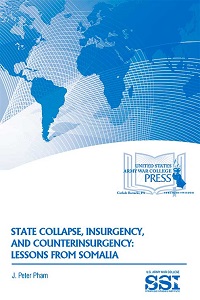State Collapse, Insurgency, and Counterinsurgency
In a monograph just published by the US Army War College, Africa Center Director J. Peter Pham argues that, after years as the world’s prime example of a failed state—one that gave rise to catastrophic humanitarian crises, a wave of maritime piracy, and Islamist militancy, including an al-Qaeda-linked insurgency—Somalia appears to be turning the corner, but whatever lessons are to be learned from the insurgency and the counterinsurgency effort, they are not the ones usually advanced by diplomats and soldiers.
Download PDF
 In the study for the War College’s Strategic Studies Institute, State Collapse, Insurgency, and Counterinsurgency: Lessons from Somalia, Pham contends that the failure for so long of any of Somalia’s successive governmental entities to prevail over their opponents and bring an end to conflict has little to do with the lack of outside assistance, especially of the military variety, often cited by way of explanation and more to do with other factors on which external actors can have little positive effect. Specifically, if the regime fighting an insurgency is unable or unwilling to take the steps to achieve internal political legitimacy, no outside intervention will be able to help it to “victory.”
In the study for the War College’s Strategic Studies Institute, State Collapse, Insurgency, and Counterinsurgency: Lessons from Somalia, Pham contends that the failure for so long of any of Somalia’s successive governmental entities to prevail over their opponents and bring an end to conflict has little to do with the lack of outside assistance, especially of the military variety, often cited by way of explanation and more to do with other factors on which external actors can have little positive effect. Specifically, if the regime fighting an insurgency is unable or unwilling to take the steps to achieve internal political legitimacy, no outside intervention will be able to help it to “victory.”
In examining how such has been the case in Somalia, Pham closely examines the nature of political legitimacy in Somali society, deriving pointers not only from the success of al-Shabaab and its allies, but also those of relatively stable new polities that have emerged in various parts of the former Somali state in mobilizing clan loyalties and local community sensibilities. Among the lessons thus drawn, which are applicable to other insurgency and conflict situations in Africa, is that the repeated failure of internationally-backed attempts to reestablish a national government in Somalia underscores the limitations of top-down, state-centric processes that are structurally engineered with a bias in favor of centralization, rather than bottom-up, community-based approaches better adapted to the local sensibilities, not just in the Horn of Africa, but also in other conflict areas across the continent, including the Sahel, where the fight against al-Qaeda in the Islamic Maghreb and its allies is ongoing.
The Strategic Studies Institute is the U.S. Army’s institute for geostrategic and national security research and analysis. The Strategic Studies Institute conducts strategic research and analysis to support the US Army War College curricula, provides direct analysis for Army and Department of Defense leadership, and serves as a bridge to the wider strategic community.
